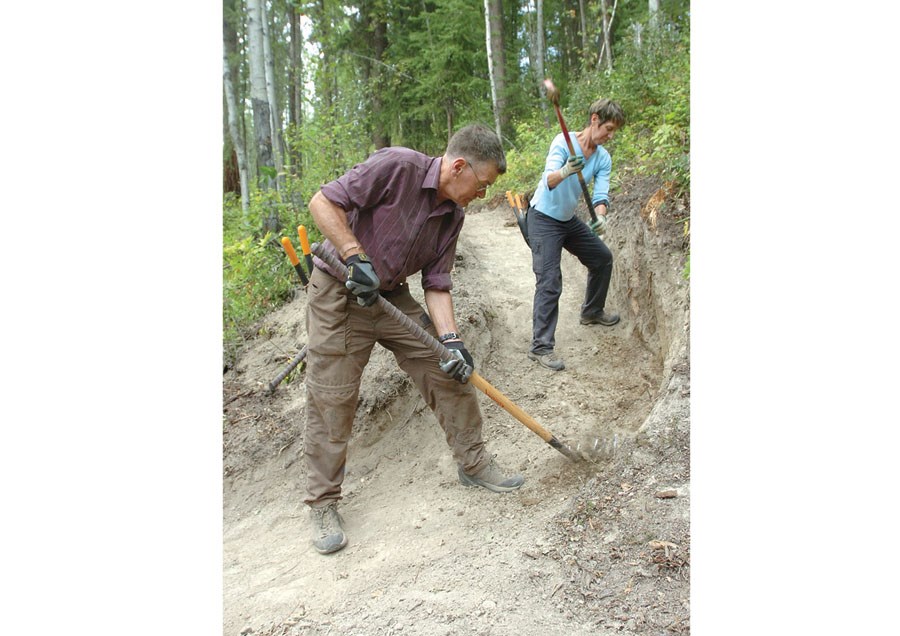Northern B.C. communities including Prince George are sitting on a virtually untapped gold mine that offers unlimited riches to mountain bike riders.
To capitalize on that, a group of tourism stakeholders have begun a project to promote what the region has to attract visitors to designated off-road trail areas.
Twelve communities and regional districts in the region are now participating in developing a mountain bike tourism strategy, a joint effort that involves the Western Canada Mountain Bike Tourism Association (WCMBTA), Northern B.C. Tourism and the Northern Development Initiative Trust.
"We've been pursuing this initiative to promote northern B.C. as a mountain biking destination since about 2006 and over that time we've gotten know more and more people in the province who have similar interests and we're getting to know the hidden gems that are out there," said Martin Littlejohn, executive director of the Vancouver-based WCMBTA.
"This just seemed to be the right time to really explore what options are available there to get more out of it in terms of what they have to offer for mountain biking. There's a lot of enthusiasm based on the response we've had and the market for B.C. as a mountain biking destination is probably as good as it's ever been and hopefully it's going to improve further."
The goal of the strategy is to better enable cities like Prince George, Burns Lake, Smithers, Quesnel, Williams Lake, Mackenzie and McBride to inform visitors about their abundant world-class off-road trails. With tourists aware of the unique qualities of those riding areas, instead of just passing through those cities, they will be more likely to consider that a destination, will want to find overnight lodging close to those trails, and will support local retailers, restaurants and service providers.
"It's a big country up there with endless adventure and there's a lot of attention that's being put on the North in terms of its tourism potential and what's going on up there," Littlejohn said. "People are becoming more aware that northern B.C. is accessible and worth checking out."
Last year, Burns Lake (2 1/2 hours west of Prince George) became the first site in Canada to be recognized as an International Mountain Bike Association ride centre. Its network of 40 kilometres of trails cater to riders of all abilities and the trails converge at a lakeside campground, making it a prime tourist destination in the warm-weather months.
Burns Lake and its annual Big Pig Mountain Biking Festival were featured in the November 2010 edition of Bike magazine and the cover referred to it as Canada's MTB nirvana. Smithers and Williams Lake also have well-developed bike parks, having accessed development grants to enhance their facilities
In Prince George, the Prince George Cycling Club's efforts to develop safe off-road trails in the 600-hectare Pidherny recreation site make it a focal point for the mountain bikers. The club helped access $70,000 in grants to pay professional trail builders to work with club volunteers to build the trails. The project was completed last fall.
"Part of our whole mandate is to promote mountain biking and so when you see a local interest involving tourism and the sport in general it's a good thing," said Liam Baker, the PGCC's Pidherny director.
"My personal opinion is we're sitting on prime territory and most people outside of the North particularly have no idea what's up here. You see quite a movement down south in Squamish, Pemberton and Whistler in trying to quantify the value of the mountain bike tourism industry. They've done studies and come up with these huge numbers, but up north it hasn't really been done because nobody has recognized how big of a sport it is and what facilities we have right in out own back yard. A lot of the trails are already in place, so it's matter of marketing and promotions."
The Prince George club wants to utilize Pidherny for mountain bike festivals that will attract out-of-town riders. Baker says the tourism strategy will prompt discussions with other cycling clubs and groups like the Cariboo Mountain Bike Consortium to show what it takes to organize and market large-scale events.
The seven-month project, which wraps up at the end of October, is funded by the Omineca Beetle Action Coalition, participating communities/regional districts and province's Ministry of Jobs, Tourism and Skill Training.
The first order of business for Littlejohn is to meet with mountain bikers in the Lower Mainland to find out what they consider important in out-of-town riding destinations and what northern B.C. areas can do enhance bike tourism based on existing practices in Squamish, Whistler and North Vancouver. In June, Littlejohn will travel the Highway 16 corridor from McBride to Terrace to survey stakeholders in the study.



